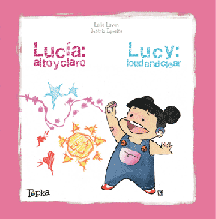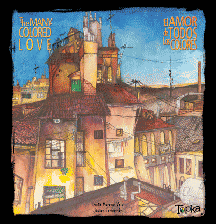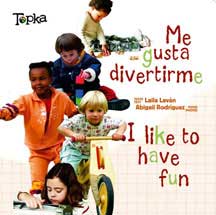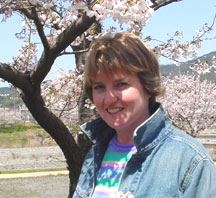the mother of eight-year-old biracial twins, one of whom has special needs, I am always on the look-out for picture books celebrating diversity. I was thrilled to come across Lucy Loud and Clear on a blog devoted to literature featuring deaf characters. Like my daughter, the main character in this story wears a hearing aid. Also like my daughter, Lucy is a bright and vigorous child, and she knows how to get what she wants. How refreshing, I thought, to see a picture book starring a disabled child in which the disability wasn’t the focus of the story.
I immediately clicked my way to the publisher’s website to find out more about Topka Books, and, more recently, I asked founder Lucia Moreno how she came to publish picture books in Spain.
WOW: So tell me, Lucia. What made you decide to start a publishing company?
LUCIA: It started with my first picture book manuscript, "A many colored love." In this story, a little girl with two mothers dreams about the baby they are expecting. I submitted it to publishing houses in Spain and I got nothing but rejections. I knew this was normal, so I kept submitting. However, I soon realized that something was amiss. The editors liked the story, but they didn't buy it because, they said, there was no market for it. Children's book editors recommended sending it to presses specializing in gay and lesbian publishing, and LGTB presses recommended sending it to children's publishers. A few times, editors asked me to send them "something else." Finally, one editor at an LGTB press accepted it, only to stall the process for two years before telling me the press owners had decided the book was too risky to publish.
At the same time, my wife and I had a child and were in the process of adopting another. We were at a loss to find books in Spanish that reflected our children's lives. I realized there was a market whose needs were not being served. When we finally adopted our daughter, a beautiful girl who is of mixed race and has a slight disability, we realized there were few books that portrayed children with disabilities, and those that did, were focused on the disability itself. We didn't want to give our daughter the idea that her life will be limited by the fact that she is disabled, adopted, not white, and has two mothers. That's where the idea of Topka came from. I started dreaming of a children's press that would publish the books we were not finding.

“We were at a loss to find books in Spanish that reflected our children's lives. I realized there was a market whose needs were not being served.”
WOW: What is children's publishing like in Spain? Are there a lot of big corporate publishers as in the U.S.?
LUCIA: In Spain, children's publishing is dominated by corporate publishers, but many small presses have found their niche. There are three or four big corporations, all with links to the Catholic Church. These publishers create both textbooks for use in the classroom and the fiction and nonfiction books you find in stores. Most of their publishing is not religious, and, may I add, most is of great quality and very entertaining, but they are naturally conservative. The perfect example is an interview I had with an editor from one of the publishing companies, perhaps the greatest of them.
I wanted to propose a picture book to her whose main character was a girl with a disability. The editor told me they had a very strict rule to only feature characters with disabilities that were talking animals, not people. “This way,” she said, "we won't be insulting anyone."
WOW: What a crazy way of thinking! My daughter is always thrilled to find characters in books or movies resembling herself. Incidentally, what does the name Topka mean? How did you choose that name and your colophon (the colored ball)?
LUCIA: Topka is a Bulgarian word meaning "ball." Our first child had a Bulgarian babysitter and we encouraged her to speak Bulgarian to him. The first word he ever spoke was "voda" (water) and promptly we were all learning some basic Bulgarian words. We loved "topka." It just sounds too good to let go. When I commissioned artist Javier Termenón to design a logo for Topka, I told him that I did not want a ball in it. We tried several logos and none worked. After having seen and rejected at least fifty, Javier send me a beautiful one where the O in Topka had been changed to a ball. He instructed me to get over my prejudice and just take it. I did.

Topka is a Bulgarian word meaning "ball."
WOW: I think it’s a fun logo—playful and bright! So how did you get started?
LUCIA: On March 19th, 2006, my mother, aunt and two children were driving toward my house when their car left the highway and crashed against a small concrete structure. My son, Manuel, who was four at the time, my mother and my aunt, all died instantly. My daughter, who was two at the time, survived. Some time later, we received a plump check from the insurance company. We were at loss as what to do with this sad, sad money. My wife told me this was a once in a lifetime opportunity to start my dream children's press. My wife has good instincts—that's why I married her—so I just did as I was told.
WOW: That’s heartbreaking. I’m so sorry for your loss. I think that the books you publish are a wonderful tribute to the life of your son. What is the first title you published?
LUCIA: The press was officially created in June 2006 and my mentors had warned me not to miss the 2006 Christmas campaign. I needed books and fast. I teamed up with Javier Termenón to create a series of three board books about a little boy with two mothers: the "Manu" series, named after my late son, Manuel. The books are selling pretty well and, best of all, children love them. I've gotten emails from parents saying their kids ask for a Manu book every night. A mother even told me her daughter sleeps with them!
WOW: So how did you hook up with Javier? And how did you go about finding an illustrator for your other books?

LUCIA: I held a casting for illustrators at a Madrid LGTB bookstore and coffee shop. I sat at my little table with a milk coffee and looked at one portfolio after another. Having the artist right there to comment on the work was very insightful. This is where I met Javier Termenón and Beatriz Iglesias, two of my most trusted collaborators. I wish I could do this every time I need an illustrator. I now hire people after seeing their web pages and a few samples sent by email, but I miss the personal contact I had with those first illustrators.
WOW: I understand. The Internet makes collaborations across continents possible, but then many writers and illustrators never get to meet. Topka books are published in both English and Spanish. Why did you decide to publish bilingually?
LUCIA: As I said before, the key to survive as a small press in Spain is to specialize in areas that big corporations don't touch but still have an audience big enough to stay in business. Spain is a small country and I needed to widen my audience. I have lived in three different countries and traveled extensively, so the natural solution for me was to sell worldwide. I decided to publish in two of the most widely spoken languages in the world: English and Spanish.
WOW: I know that distribution is one of the toughest challenges facing small presses. How do you get the word out about your books?
LUCIA: When I first started, I did a nationwide press campaign that got some attention, but that was just too expensive to do on a regular basis. Right now, I focus on interest groups, promoting each title through email and contact with people and organizations that might be interested in it. Most of the book's promotion is then done by word-of-mouth.
I also have a website, www.topkabooks.com and an electronic newsletter. The newsletter is irregular, but there are about seven per year. I usually include a small piece of news about Topka and then an article about an issue within our area of interest: parenting, disability, race, books, etc. These articles can also be found in the blog section of the website.
I also like to be present at "real life" events. When a book comes out, I hold a small presentation party at a bookstore. I also arrange for my authors to do book signings at the main Spanish book fairs. Last year, we did a few story times at public libraries and independent children's bookstores and I hope to do more as soon as I find a replacement for the actress that was doing them.
WOW: All of this must keep you very busy! You have a small child and are a writer yourself. So, how do you balance writing, publishing and editing, and motherhood?
LUCIA: This is, of course, the question. Right now, I have a lot of exciting projects, including some freelance writing and a script commissioned by a producer to add to my regular load as an editor and business owner. But every weekday at 4 pm, I am at my daughter's school and from then on until the next day at 8 am I am nothing but a mother (and maybe, just maybe, a wife).
I walk one hour a day, five days a week, with my friend and neighbor Rushna, to charge up on energy. When I get home, I shower and get my timer out. I write a list of things that need doing and set a limited amount of time for each task, racing the timer to do it on time. As for my personal writing, I write longhand on a notebook that I keep with me at all times. I use every single free moment to work on whatever project I have in my hands: waiting at the doctor's office, sitting on a subway bench, etc.
Today is Monday, so my daughter has her music class from 4:30 pm to 5:30 pm. I got one whole hour right there to finish the first draft of a YA novel I've been writing for a year.
“I use every single free moment to work on whatever project I have in my hands: waiting at the doctor's office, sitting on a subway bench, etc.”
WOW: The timer is a great idea! I think I’ll try that, too! I’m sure you read to your daughter. Do you "test" stories or books on her? Does she have a favorite Topka book?
LUCIA: I tell my daughter stories all the time, and I do test books on her occasionally, but not as a rule. Her favorite Topka books are the Manu series, but right now, she's more into pink, fluffy stuff that I wouldn't publish to save my life.
One funny thing is that she believes every single copy of a Topka book is mine, so we try to avoid bookstores at all cost because she will take the whole pack of them and try to take them home with us. It is very embarrassing and we have found out that security people in stores have heard it all and just won't take your word for it. Actually, we're fortunate no one has called Child Services on us claiming we are using a four-year-old to shoplift.
WOW: You're working from Spain with a book designer in Tanzania and a Japanese illustrator and American writer in Japan. How do you keep everything running smoothly?
LUCIA: I don't. There are always things that go wrong, and there are always moments where someone has to rush to meet a deadline, but I think that's just part of the business. What matters is how people respond to any problem that might arise and I have found that professionals always rise to the challenge; that's what makes them professional. I feel a great respect and admiration for the people who have contributed to Topka. They keep me awake and working to meet their high standards and they have made Topka a success way beyond my dreams.

“I am thrilled that these books are being read in schools.”
WOW: Speaking of success, you told me that you recently sold close to 300 of your books to New York Public Libraries. How did you pull that off?
LUCIA: I contacted The Bilingual Publications Company, a small New York company, dedicated to selling bilingual (Spanish/English) books to public libraries in the U.S. They asked for a few samples and I sent them. They just happened to receive them right before a meeting with librarians from the New York Public Library. The librarians liked the books and ordered 300. I was just lucky, really.
Another amazing bit of luck came last fall when a public servant working for the Castilla Leon (a region in Spain) program to promote reading in public schools saw some of Topka’s titles in her local independent book store. She liked them and contacted me about buying some. I ended up selling the program 15,000 copies of the Ttales/Tcuento collection. I am thrilled that these books are being read in schools.
WOW: That’s wonderful! Can you tell us about some of your forthcoming books?
LUCIA: Right now, I am working on the Ttales/Tcuento 2008 batch, which will be released in November 2008. I am very excited about the titles. I frankly think these will be Topka’s best books ever.
In Where Is My Butterfly? by Alicia Romero, Chris has lost the magnet in her cochlear implant, which she calls her "butterfly," and searches the whole school for it. Alicia has worked with deaf children for years and she wanted to tell a story they could identify with.
The magnets in cochlear implants are worn on the outside of the head and they often get stuck to metal objects the children approach. This is very serious, as the magnets are expensive and parents are not happy when they get lost. To illustrate the story, Alicia drew on her well of knowledge of deaf children and their unique point of view. This is a deceivingly simple book that I'm sure will be loved.
We’re also publishing Bubbles by Gwyneth Box in which a black boy, who also happens to be a wheelchair user, wonders why bubbles are always white, even when he uses soaps of many different colors. When I read this poem by Topka's translator, award-winning poet Gwyneth Box, I asked her to, please, pretty please, let me make it into a picture book.
WOW: My own daughter has a cochlear implant and uses a wheelchair, so I’m sure we’ll be able to relate to these books. Thinking ahead, what is your long-term goal for Topka Press?
LUCIA: My long-term plans for Topka are to move on to easy readers, chapter books, and novels. I would also like produce audiobooks, which, as any mother with long commutes to and from school knows, the market is desperately short of. But, I don't think I'll ever stop making picture books. They're just too much fun.
WOW: Are you actively looking for manuscripts?
LUCIA: I'm always looking for manuscripts and samples from illustrators, but please read the guidelines (available at www.topkabooks.com) first. For fiction, I get a lot of "red dog moves to planet inhabited by yellow dogs that tease him for being different with a moral on being nice to people who are different at the end" and this is just not the kind of thing Topka publishes.
I am looking for stories told from a child's point of view, with a main character who is a child and a member of a minority (race, culture, disability, you name it) or lives in a "non-traditional family" (divorced, single or same sex parents, children living in institutions, parented by older siblings, aunts, uncles or grandparents), with a conflict that is meaningful to children and solved by the child (no adult intervention), and where difference is not the main focus. Please don't center the conflict around difference and do not attempt to explain difference. On the other hand, don't just pretend it doesn't exist or it is not relevant. I am very interested in stories written from the inside, that is, by writers who are members of minorities.
Right now, I am especially interested in main characters with parents who are divorced and do the "this week here, next week there" routine or the "school day/weekend" routine. Think in these terms: if a child in this routine would solve a mystery, what would the mystery be? How would he solve it? How would his moving around hinder his detective work? How would it enhance it? I am very interested in mystery and humor, both at the picture book and chapter book level. But keep in mind that time for publication for chapter books would be more than 24 months.
I am looking for stories told from a child's point of view, with a main character who is a child and a member of a minority...or lives in a "non-traditional family"....
As for nonfiction, I don't get any, but would love to see some. Any concept book featuring children who are members of minorities, be it a number book, an ABC, a "Mary's day" kind of thing would be nice—especially if illustrated with photos. Also, I would love to see books on one subject seen from the point of view of different communities, stressing what we all have in common rather than the differences. For example, a book on team sports that would include sports from all over the world, but also sports played only by women or by blind people and that stress how they all have rules and they all need the team members to trust one another, etc.
Illustrators can send samples by email (propuestas@topka.es), but please zip them. No racist, stereotypical or dated characters, please.
WOW: Well, I’m a big fan of your press and I wish you the best of luck in the future. Thanks for your time!
Find out more about Lucia Moreno and Topka Press by visiting: https://www.topkabooks.com

BIO:
Suzanne Kamata lives in Tokushima, Japan. She’s the author of the novel Losing Kei, and editor of the anthology The Broken Bridge: Fiction from Expatriates in Literary Japan and the literary journal Yomimono.
Suzanne also interviewed Wendy Nelson Tokunaga for WOW!’s July issue.